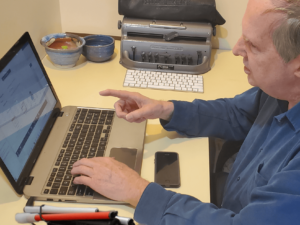Carroll Center Launches Virtual Rehabilitation for Individuals with Vision Loss
BY THE CARROLL CENTER FOR THE BLIND (VIA INVISION MAGAZINE)
 NEWTON, Massachusetts – To ensure that people who are blind and visually impaired receive training and support during the COVID-19 pandemic, the Carroll Center for the Blind in Newton, MA has launched virtual rehabilitation for individuals of all ages and all stages of vision loss.
NEWTON, Massachusetts – To ensure that people who are blind and visually impaired receive training and support during the COVID-19 pandemic, the Carroll Center for the Blind in Newton, MA has launched virtual rehabilitation for individuals of all ages and all stages of vision loss.
The adjustment to vision loss does not stop given the ongoing pandemic—in fact, the need to stay connected to critical blindness rehabilitation is more important than ever. Although the nonprofit is not currently providing face-to-face instruction on its campus or in the community, the renowned blindness rehabilitation institution is providing instruction through a variety of remote methods to school-age students, adults, and seniors across the nation.
The Carroll Center’s team of expert blindness professionals are remotely teaching on a variety of topics, including:
- Activities of Daily Living
- Technology Skills and Assistive Technology
- Braille
- Low Vision Devices
- Employment Readiness
- Health Management
Recognizing that schooling and many workplace meetings are now being offered through Zoom and similar telecommunications platforms, the nonprofit is also teaching consumers how to effectively use these technologies.
Additionally, the Center is providing counseling support, assistance with resources and diabetes management, as well as support to use the variety of remote methods such as Zoom.
“We are actively engaging with consumers to make sure everyone is supported with skills and resources to be safe and connected,” says Dina Rosenbaum, chief program officer at The Carroll Center for the Blind. “I am amazed with how many consumers have reached out to stay connected during a challenging time with even more social isolation. We have assisted diabetic patients who need help managing their health needs, provided counseling support during this anxious time and instructed many on how to use remote applications and assistive technology.”
Read the full story about the Carroll Center’s Virtual Rehabilitation here.


